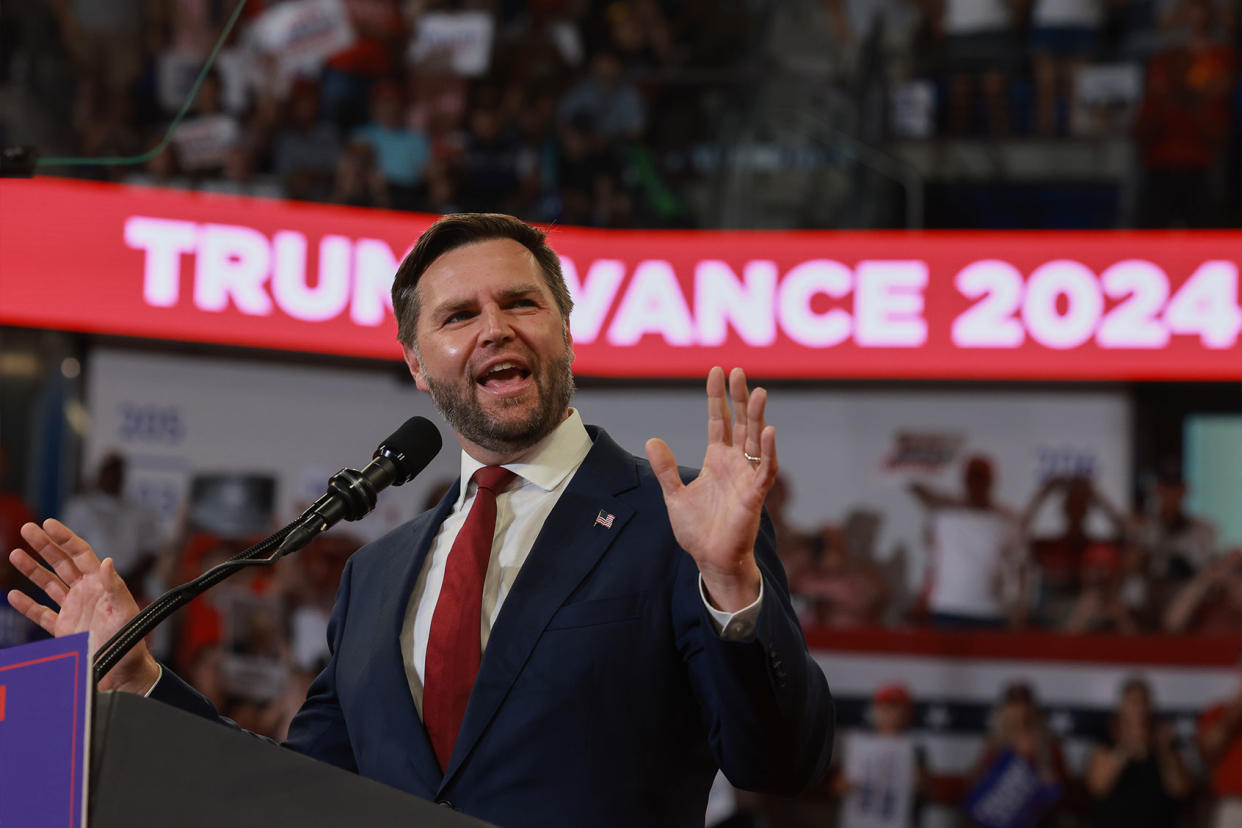Why is JD Vance being so weird about Mountain Dew?

- Oops!Something went wrong.Please try again later.
While filming a Newsmax segment about the dangers of fentanyl crossing the southern United States border last week, Republican vice presidential nominee JD Vance shared a story about his own mother’s drug overdose and said “there are millions of Americans who could have a second chance with their loved ones if we make smarter decisions.”
“I know what it feels like when we make dumb decisions and people suffer,” Vance said, seconds before a member of the Newsmax crew handed both him and host Bianca de la Garza bottles of Diet Mountain Dew. “Yes you do, firsthand,” de la Garza replied.
“Should we toast here?” Vance asked as he unscrewed the plastic cap from the bottle. De la Garza acquiesced and the pair shared a quick toast before taking their respective swigs. “This is the good stuff here,” Vance said. “High caffeine, low calorie.”
This isn’t the first time in recent weeks that Vance has referenced Mountain Dew during public appearances, and it’s been done with enough emphasis that the phrase has trended with his name alongside words like “couch” and “dolphin.” However, the tonal mismatch of segueing from a story about a family member’s coma to a soda tasting is notable and leads one to ask: Why is JD Vance being so weird about Mountain Dew?
The short answer to that question takes us back to July, when Vance put on his first stand-alone rally as former President Donald Trump’s 2024 running mate. While on stage, Vance attempted to bond with the crowd by delivering a joke about how liberals are too easily offended and quick to point out what they perceive to be racist behavior.
“Democrats say that it is racist to believe — well, they say it’s racist to do anything,” he said. “I had a Diet Mountain Dew yesterday and one today. I’m sure they’re going to call that racist too.”
Vance then held for applause, which, aside from a few scattered claps, didn’t come. The joke bombed and other politicians, including those eying a spot as Kamala Harris’ potential 2024 vice presidential pick, quickly jumped on the awkwardness.
For instance, Kentucky Governor Andy Beshear appeared on CNN the day after the rally to discuss Vance’s perceived shortcomings, including the fact that he reportedly referred to Trump as “the next Hitler” behind closed doors, but was now publicly supporting him. Beshear also simply described Vance’s Mountain Dew comments as “weird,” questioning who actually drank the beverage (he later apologized for this characterization, though notably only to Diet Mountain Dew — not to Vance).
Underpinning both Vance’s rally joke, and the broader response to it, are questions about whether Vance is actually as much of an everyman as he says he is, specifically when it comes to what he says are his Appalachian roots. While Vance wrote “Hillbilly Elegy” — a stereotype-packed book that award-winning Appalachian writer and Duke University professor Mesha Maren describes as having “eugenics-tinged genetic arguments that stain the text” — many in the Appalachian region don’t want to claim him.
Some of this is based on geography; reportedly, the New York Times standards desk sent an email out in July to reporters cautioning them to avoid referring to Vance as a “son of Appalachia” because of this.
“It’s natural to think that someone who wrote a memoir entitled ‘Hillbilly Elegy’ is from Appalachia,” the memo read. “But there is an official government definition of Appalachia, and it’s quite expansive running all the way from counties in Mississippi to counties in New York State. And even by that expansive definition, Middletown, Ohio, where Vance grew up, is not Appalachia.”
However, some of the hesitation from those in the region about Vance is rooted in something deeper — a sense that he doesn’t actually understand them. To them, Vance's portrayal of Appalachian in both his book and on rally stages feels like an outsider's perspective, oversimplifying the complexities and resilience of their communities. They argue that his lens of individual responsibility overlooks systemic issues and the strong sense of solidarity that binds them together. For these Appalachians, Vance's account does not resonate with their lived experiences or reflect the nuanced, multifaceted reality of life in the region.
Gov. Beshear put it plainly in the same press conference where he apologized for dunking on Mountain Dew. Of Vance, Beshear said: “Let me just tell you, JD Vance ain’t from here.”
Mountain Dew, however, has become a neon-hued cultural symbol in the region.
Originally created in Tennessee as a whiskey mixer (its name a wink to the term for homemade moonshine) the soda was heavily marketed for decades in rural and working-class communities throughout Appalachia and the American South at large. As a result of this, it has both suffered being characterized as a lower-class indulgence, while also being celebrated for its flavor and pop culture ubiquity.
It makes sense that Vance would want to associate his name with the beloved, if occasionally ridiculed, brand — though his current strategy obviously isn’t working.
